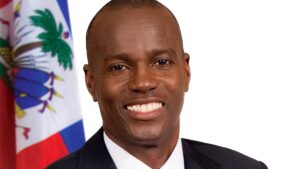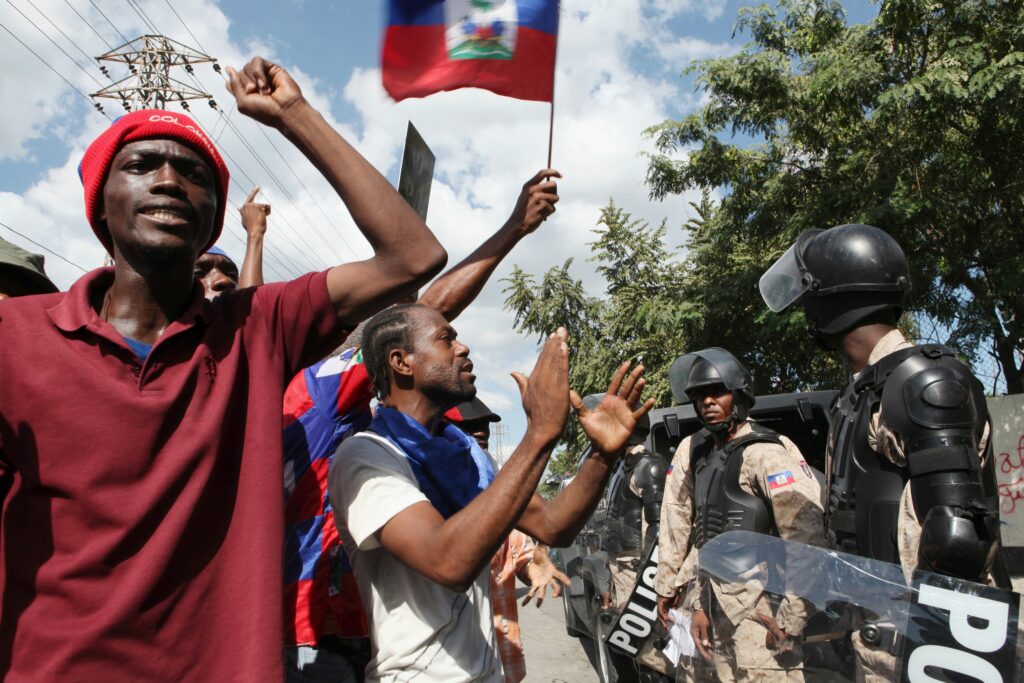PORT-AU-PRINCE, Haiti (AP) — Government-backed candidate Jovenel Moise and former state construction chief Jude Celestin appear to be advancing to a runoff election for Haiti’s presidency, according to preliminary results announced Thursday.
 The much-anticipated results from the 54-candidate first-round presidential contest on Oct. 25 were issued by Pierre Louis Opont, the leader of the Provisional Electoral Council. Since no candidate won a majority in that ballot, the two top finishers are set to meet in a Dec. 27 runoff.
The much-anticipated results from the 54-candidate first-round presidential contest on Oct. 25 were issued by Pierre Louis Opont, the leader of the Provisional Electoral Council. Since no candidate won a majority in that ballot, the two top finishers are set to meet in a Dec. 27 runoff.
Opont did not take any questions from reporters after delivering the preliminary results at the council headquarters, which was under guard by heavily armed police. He said Moise received 511,992 votes or 32.8 percent of the total, and Celestin got 394,390 or 25.2 percent.
 Seven of the council’s nine members signed off on the preliminary results, indicating that there was not unanimous agreement with the tally. An appeals period will follow the Thursday announcement and officials say certified results are expected in late November or early December.
Seven of the council’s nine members signed off on the preliminary results, indicating that there was not unanimous agreement with the tally. An appeals period will follow the Thursday announcement and officials say certified results are expected in late November or early December.
Moise, handpicked by outgoing President Michel Martelly to be his successor, greeted applauding partisans gathered at a fancy hotel in Petionville, not far from the electoral council headquarters. Looking into TV cameras, the top vote-getter told Haitians they were backing the right man.
“I’m standing in front of you because I am the winner,” said Moise, an agricultural entrepreneur who set up a banana plantation in Haiti’s north and founded a public-private project called Agritrans to successfully export the fruit to Europe.
But several major candidates have alleged fraud by the well-financed Tet Kale campaign behind Moise and voiced concern that the results do not accurately reflect national will.
The candidate who placed third in the official tally with 14.2 percent, former senator Moise Jean-Charles, has asserted in recent days that he won half of Haiti’s 10 departments. Last week, he insisted that partially burned ballots checked with his name were found by his backers in Port-au-Prince and numerous ballots supporting his bid had gone missing elsewhere.
After the preliminary results were announced, Jean-Charles said the results were a sham orchestrated by Martelly, who he insists would be pulling strings in a Moise presidency. He called on his supporters to participate in a “peaceful revolution” to ensure their voice is heard.
But tire barricades were already burning in a few spots of Port-au-Prince and Associated Press journalists saw one dead body on a street in the neighborhood of Delmas 33.
A crowd of Jean-Charles supporters gathered around their dead colleague and insisted he was fatally shot in the neck by officers with a newly created police unit referred to as BOID. Chanting “freedom or death,” the crowd scattered Jean-Charles campaign posters around his corpse.
In recent days, eight presidential candidates, including Celestin and Jean-Charles, asserted that there were instances of “massive fraud” during Oct. 25 election — perhaps as a way to prepare their partisans for a loss. They warned that if fraud went uncorrected it “would make the alleged results of these elections unacceptable” and asked the council to form an independent commission to review the electoral processes over the next 15 days.
Celestin’s campaign manager did not offer any immediate comment now that his candidate apparently secured a spot in the runoff. At least one presidential candidate in the top 10, Pierre Sauveur Etienne, said he would throw his support behind Celestin, the government-backed candidate in the last election cycle.
The top two finishers announced in preliminary results don’t always make it to a runoff in Haiti. During the last election, disputed preliminary results showed Celestin edging out Martelly for one of two spots in a runoff ballot, but under international pressure Haiti’s electoral authorities reviewed the count and eliminated Celestin from the race.
___
David McFadden

